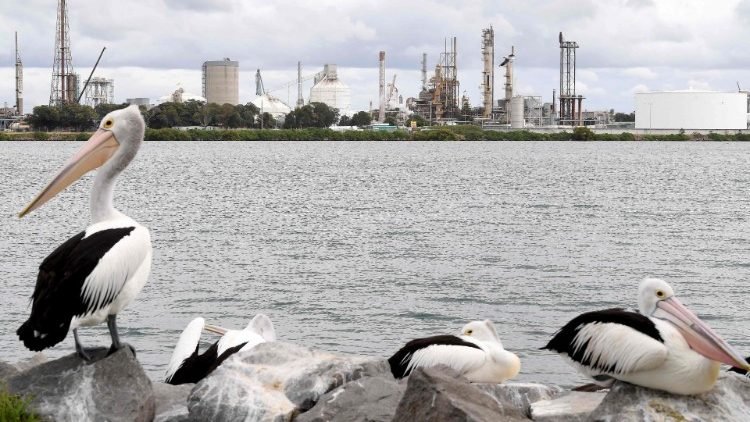A recent investigation into the extent to which countries were able to meet their climate pledges, shows that 56% of the examined nations failed to meet the emissions reduction goals they established at COP15, raising concerns about the attainment of future climate targets.
By Federico Citterich
19 out of 34 countries failed to achieve their CO2 emissions targets set at COP15 for the year 2020, new research has found.
It comes amid a worsening global Climate Crisis and the publication in November 2023 by Pope Francis of his Apostolic Exhortation Laudate Deum (in advance of the 28th UN Climate Change Conference). In that document, the Pope reiterates his urgent call for action to tackle climate change, while also criticizing a failing global response to the crisis.
Meanwhile, the study in question, published in Nature Climate Changeand led by University College London, Kingston University London, University of Groningen, and Tsinghua University researchers, was the first to assess the extent to which countries were able to meet the climate pledges set at COP15 in 2009.
To do this, the authors used emission and energy data from the International Energy Agency and global models of CO2 emissions based on national accounts.
Only 15 of the 34 countries – Bulgaria, Croatia, Denmark, Estonia, Finland, Germany, Greece, Italy, Latvia, Lithuania, Romania, Slovakia, Sweden, the United Kingdom, and the United States – achieved their emissions reduction goals.
Of the 19 countries that failed to fully meet their CO2 emissions targets for 2020, 12 failed outright. These included Australia, Austria, Canada, Cyprus, Ireland, Japan, the Netherlands, Norway, Portugal, Slovenia, Spain, and Switzerland. The remaining seven – Belgium, Czech Republic, France, Hungary, Luxembourg, Malta, and Poland – reduced carbon emissions within their own borders, but achieved that by outsourcing carbon-intensive processes to other countries, a practice known as “carbon transfer”.

Environmental activists march during the COP26 Summit in Glasgow
The process of carbon transfer
“To detect carbon transfer, it is crucial to differentiate between territorial and consumption-based emissions,” said Klaus Hubacek, a Professor in Science, Technology and Society at the University of Groningen and co-author of the study. “This enables us to understand whether countries reduced their territorial CO2 emissions by outsourcing polluting practices.”
The authors highlighted that territorial carbon mitigation should be achieved by improving sustainability efforts rather than by outsourcing pollution to other countries.
“However, completely avoiding carbon transfer is challenging because it is an integral part of international trade, an important component of our society,” Hubacek added. “Avoiding carbon transfer is impossible without also avoiding trade.”
Rather than cutting trade-based carbon transfer, Hubacek explained that countries should primarily focus on territorial mitigation efforts and emissions along the entire supply chain.

“Magma Plastique” by Lebanese artist Nabil Farhat challenges conventional notions of recycled plastic by demonstrating its scalability and applicability
An eye on the future: towards meeting the Paris Agreement targets
According to the authors, timely tracking the countries’ mitigation efforts is “critical for meeting the Paris Agreement targets,” the climate pledges set at COP21 in 2015 that aim to “keep the rise in global surface temperature to well below 2 °C (3.6 °F) above pre-industrial levels.”
The fact that most countries failed to achieve their emissions reduction goals for 2020 raises concerns as to whether they will be able to meet their Paris Agreement targets.
“It is important to highlight that the countries set their targets based on their own capabilities, yet they still failed to achieve their CO2 reduction goals,” said Hubacek. “Additionally, these targets are not ambitious enough.”
Countries unable to meet their targets mainly failed because their CO2 reduction efforts were surpassed by the increased consumption associated with rising economic and demographic growth.
“This shows that developed countries should focus away from GDP growth in favour of fostering a more equal and fair society,” explained Hubacek.

COP21 in Paris in 2015 where 190 countries adopted an agreement to mitigate climate change
Investing in a greener economy
“Understanding why countries failed to achieve their emissions targets is crucial to notify and inform policy-makers,” said Shaikh Eskander, a senior lecturer in Economics at Kingston University London and co-author of the study.
According to the scientists, countries should introduce new incentives for green research and development with the aim of facilitating the achievement of climate pledges.
“Similar facilities are already present, but more are needed to encourage a greener economy,” added Eskander.
As explained by the authors, this is not going to be immediate, but gradual and incremental.
“Since the budget is often limited, we need to prioritise urgent needs,” said Eskander. “However, it is crucial for policy-makers to understand the damage caused by climate change and recognise that spending money on sustainable advances means investing for the future.”
Climate change and future generations
“Global warming doesn’t necessarily mean that our seasons are becoming warmer,” said Eskander. “It also means that the weather is becoming increasingly unpredictable.”
“We also need to think of our future generations,” added Eskander. “If climate change persists at this pace, later generations will be left with significant environmental, health, economic, and social problems.”
According to the authors, this is why we need to improve and incentivise our sustainability efforts.
“We need to accept our responsibilities for the impacts that our CO2 emissions create globally,” concluded Hubacek. “It is crucial that we implement new, sustainable ways of producing and consuming.”

Flood-affected children in India



